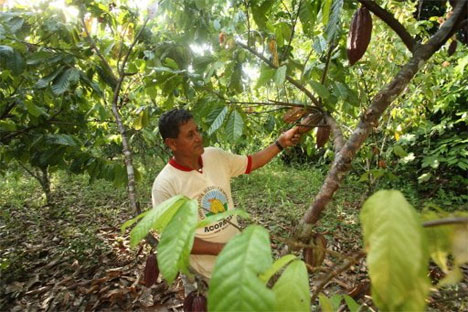
Farmer surveys cocoa trees in Peru
Peruvian Farmers Happy to Offset West's Carbon
by Stephen Messenger, Porto Alegre, Brazil on 03.30.10
via treehugger.
Peruvian farmers are about to get a windfall--and it's all thanks to the burgeoning carbon offsetting market. Recently, one particular section of Peru was selected to be the site of a reforesting operation to offset CO2 emissions of Nestle Waters France over 6 thousand miles away. But, in age where the appearance of environmental responsibility often supersedes actual responsibility, the bottled water company has enlisted the help of France's most well-known environmentalist to head the tree planting project to show that all is on the level--and he insists that Peruvians won't be the only ones to benefit from it.
According to Globo, the project will be carried out by the carbon management company, The Pure Project, which was founded by Tristan Lecomte. The Frenchman is no stranger to environmental issues or Peru, having established France's best known fair trade brand, Alter Eco, which has worked with Peruvian cocoa farmers in the past.
The large bottled water company produces approximately 115,000 tons of carbon a year, and Lecomte intends to offset the release of the greenhouse gas by planting 350 thousand in Peru and Bolivia each year, at a price tag of about $550,000. Working with the same small farmers that provide cocoa for Alter Eco, Lecomte sees the benefits of the project as being nearly universal.
These farmers are organic, they benefit from fair trade and now they plant these trees so they also fight against global warming They are at the forefront of the fight against climate change, they see the change in the weather and they want to fight against it for themselves and their children.
Most of the trees that will be planted are tropical hardwoods which will help fill in swaths of the Amazon rainforest cleared from slash and burn agriculture. Lecomte's company, The Pure Project, will pay farmers around 30 US cents for each seedling they plant on their land.
Beyond the immediate financial incentive to reforest their land, cocoa farmers will benefit from the planted trees. Cocoa typically grows best in the shade of a forest canopy, and the broad-leafed tropical trees will provide ideal cover. Also, once the trees have reached a certain diameter, farmers will be allowed to harvest them as lumber.
"Apart from reforesting, we're doing business," said one cocoa farmer.
Over the next five years the project intends to plant some 4 million trees, offsetting millions of tons of carbon in the coming decades, all while strengthening the oxygen producing Amazon rainforest--and the livelihoods of the people who live and work within it.
Lecomte is optimistic that other large corporations will learn from this project in Peru.
Multinationals now understand that they have to change their model if they want to be sustainable and small farmers have the key to develop sustainable projects.






No comments:
Post a Comment